Jamaican Civil Society Organisations (CSOs) Benefit from Legal Literacy and GBV Prevention and Response Training
Date:
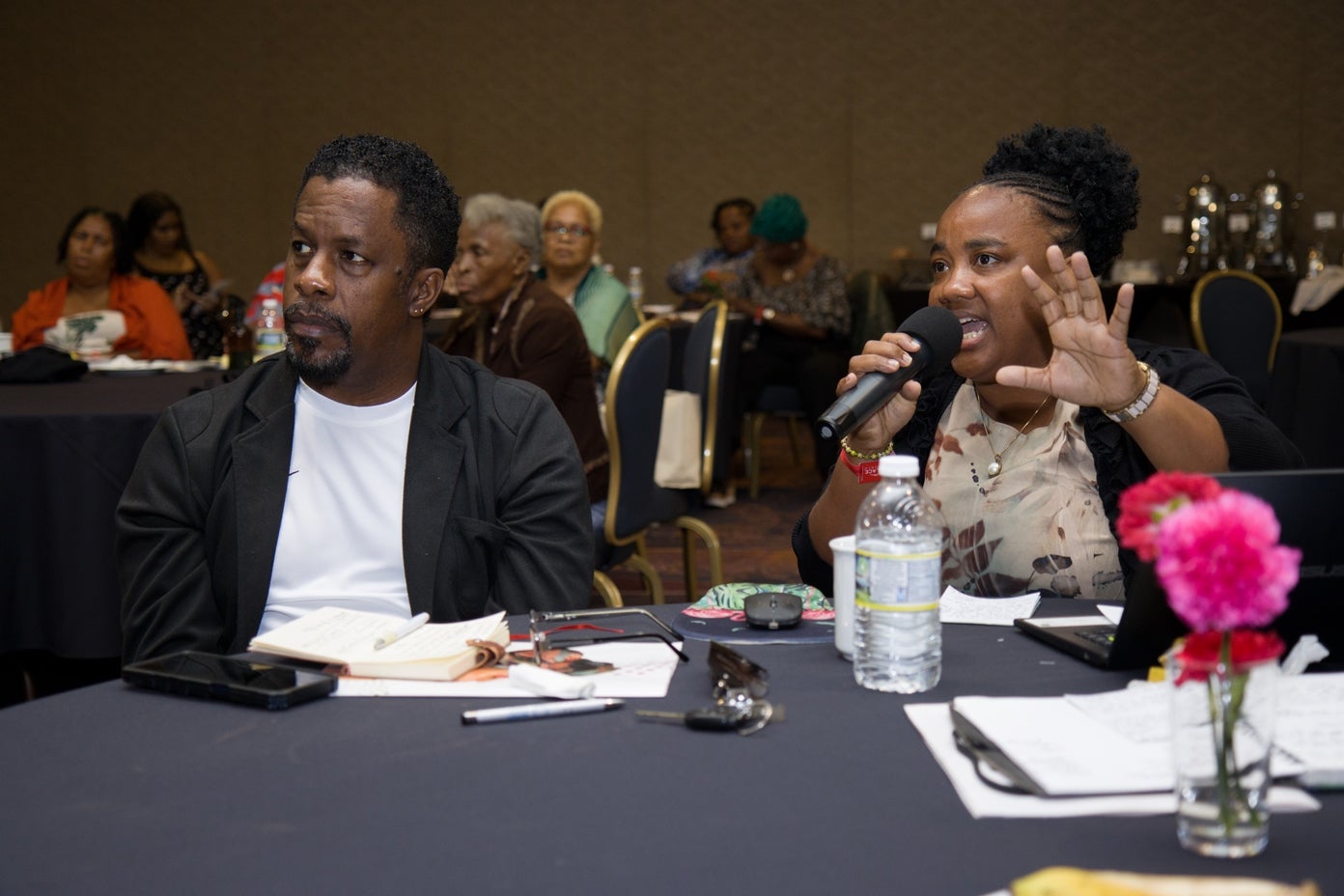
(L-R) O'Brien Thomas, Manchester Peace Coalition and Sara-Lou Angelique Morgan-Walker, The Angelic Ladies Society Ltd. UN Women Photo/Dorian Clarke
November 8, 2023: Progress towards achieving Sustainable Development Goal 5, indicator 2, the elimination of all forms of violence against all women and girls (VAWG) in public and private spheres in Jamaica is driven in part by the significant work of civil society organisations (CSOs) who champion VAWG prevention and response. However, without the requisite funding, relevant knowledge, and active participation of diverse groups in civil society for VAWG prevention and response today, it is unlikely that CSOs will effectively serve vulnerable populations.
With the support of the EU-UN Spotlight Initiative in Jamaica, UN Women hosted a four-day Civil Society Organisations’ Capacity Strengthening Retreat that brought together women’s rights groups, community-based organisations and other CSOs working with marginalized groups. The retreat kicked off with a listening dialogue that explored gender equality concepts and social norms that perpetuate gender-based violence. The participants also focused on legal literacy, the implementation of community-based GBV programmes for key vulnerable populations and the creation of proposals to secure technical assistance and grants, which included skills building in finance planning and monitoring and evaluation.
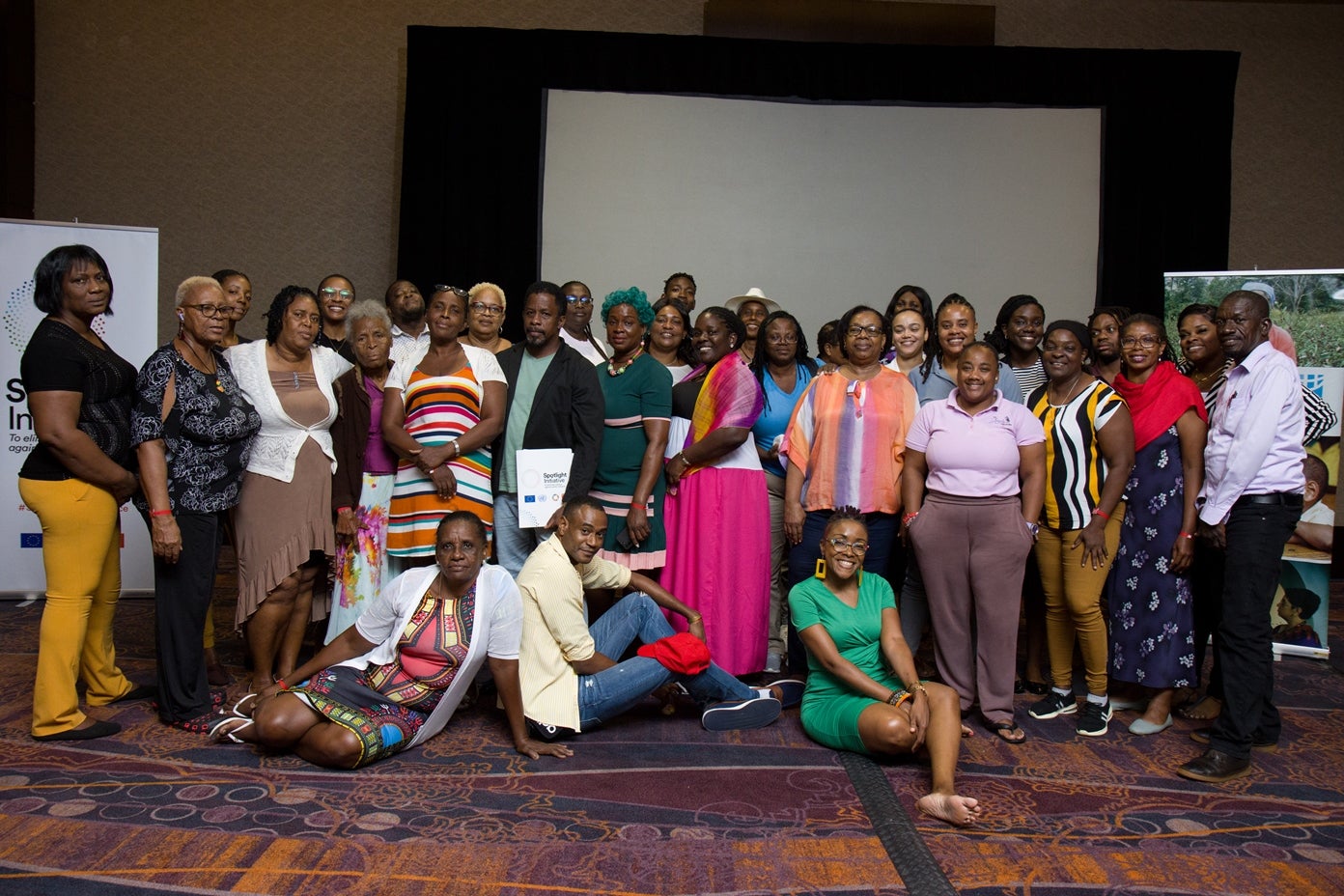
Group photo of the CSO representatives in attendance at the CSO Capacity Strengthening Retreat. UN Women Photo/Dorian Clarke
According to the Jamaica Women’s Health Survey 2016, almost one-fifth of women who experienced physical or sexual partner violence remained silent with over one-third (39.1 per cent) of the women who sought help indicating that they received no help.
UN Women caught up with attendees from four civil society organisations to hear how they would be incorporating the lessons learned into their programming to better serve their target populations.
While reflecting on her organisation’s work with women in agriculture and agri-business industries particularly in rural communities, Ms Natayla Reid, St. Ann Parish Representative for the Jamaica Network of Rural Women Producers said: “We want to ensure that rural women and girls are aware of the biases and stereotypes that comes with gender-based violence and how to eliminate these biases and stereotypes. We also want them to be aware of the necessary steps to take if they experience GBV or someone that they know is experiencing GBV...You are not alone.”
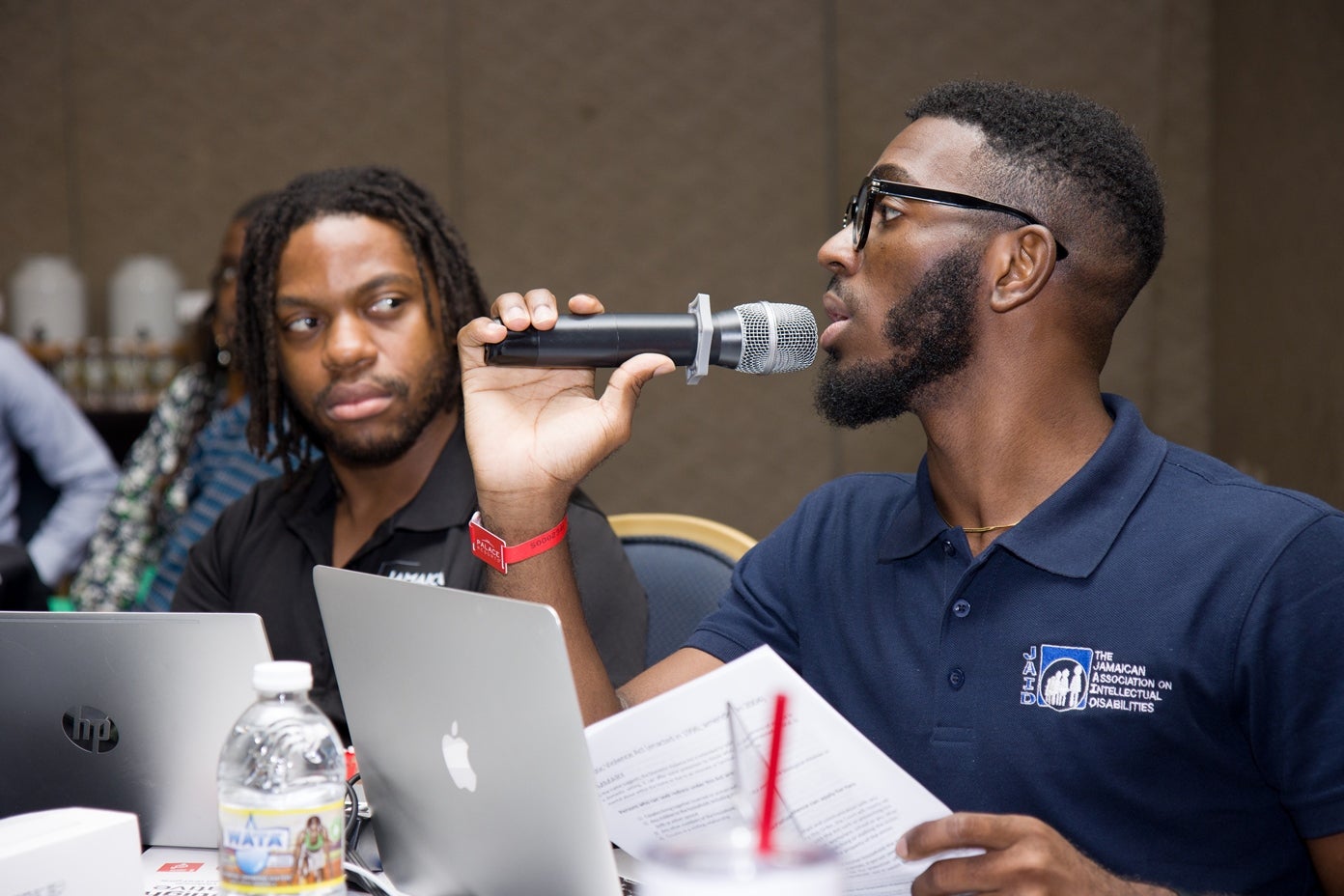
Pictured to the right, Gavane Ferguson, Development Manager for The Jamaican Association on Intellectual Disabilities (JAID) participates in the discussions. UN Women Photo/Dorian Clarke
Mr Gavane Ferguson, Development Manager for The Jamaican Association on Intellectual Disabilities (JAID), which co manages five schools with the Ministry of Education, shared similar sentiments regarding the importance of the training.
“The learnings from this workshop will support JAID in the work that we have started in providing support to victims as well as those who aren’t, but are persons with intellectual disabilities within the school setting and outside. We [JAID] believe in knowledge sharing so we will be supporting the work within the schools by training professionals such as guidance counsellors, principals and teachers on how to diagnose and identify gender-based violence within our school system, as well as support parents regarding how these incidents are dealt with and how they can be referred to the relevant support services.”
Mr. Ferguson added: “Persons with intellectual disabilities are three (3) times more vulnerable than any other disability group and issues like gender-based violence are so taboo that they are not taken seriously when seen in this group of people.”
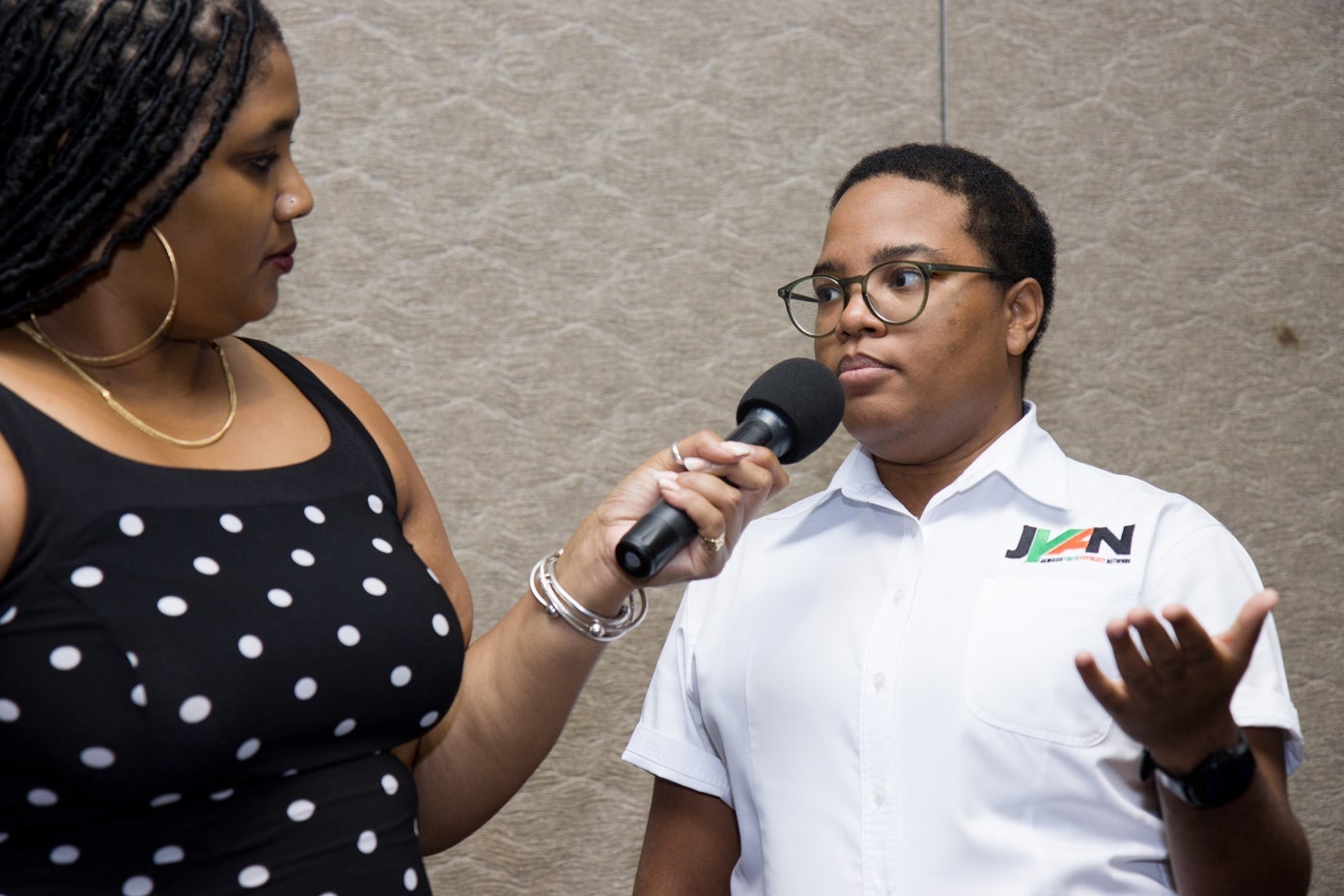
(L-R) Carla Moore, UN Women Consultant and Shannique Bowden, Executive Director, Jamaica Youth Advocacy Network (JYAN). UN Women Photo/Dorian Clarke
In a statement, the Jamaica Youth Advocacy Network outlined: “Over the course of the workshop, we have received much clarity on how gender-based violence affects children and youth – our primary target groups. We are currently implementing a project with UN Women under the EU-UN Spotlight Initiative to engage young people around GBV issues and their impact on youth which seeks to build the capacity of youth leaders to advocate for GBV related issues they are seeing in their schools, communities, and wider networks.”
The Youth-led organisation also noted: “The information we have been exposed to will allow us to ensure that our advocacy efforts are focused on the real challenges being experienced and that our recommendations are aligned with the immediate needs of our community… Our focus is children and youth in all their capacities and backgrounds and that calls for us to step out of our comfort zone and re-imagine different approaches and collaborations.”
Boosting a rich history of grassroots work alongside Sistren Theatre Collective, Patricia McCrae, a member of Hannah Town Cultural Group expressed a keen interest in the training to be positioned to secure technical assistance and grants to support the work to end VAWG.
Ms McCrae highlight that: “With this workshop, we are better placed to access funding so we can work even more on educating the nation on the right approach when dealing with different issues such as gender-based violence and advocating even in Parliament using Drama and Music.”
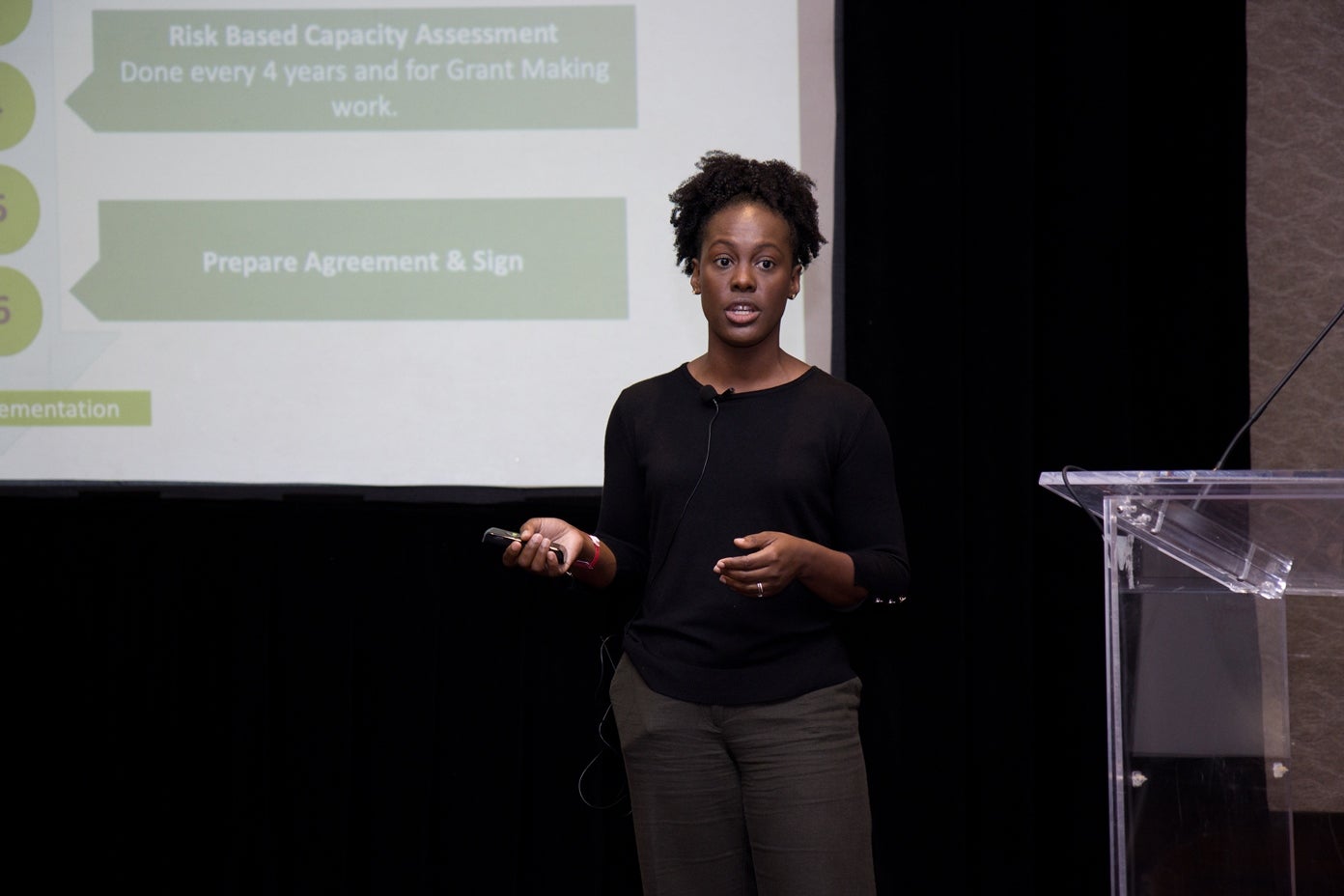
UN Women Project Coordination Analyst, Mrs. Shadé Maycock facilitates a session with civil society organisations. UN Women Photo/Dorian Clarke
This event was a part of UN Women’s activities under Pillar 6 of the Spotlight Initiative which includes a series of small grants to support the expansion of technical substantive capacity of groups working on innovative programmes to end violence against women and girls (VAWG) in Jamaica, and to support organisations in building their capacity to engage with parliamentarians and policy makers to influence law and policy developments and with media to promote gender-responsive messages on prevention, protection and response to intimate partner violence (IPV) and child sex abuse.
An end to violence against women and girls and family violence more broadly across Jamaica cannot happen without the full engagement of women, girls and men and boys. The Spotlight Initiative will continue to engage all relevant stakeholders, including civil society as advocates and key actors to end violence against women and girls.